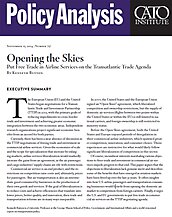Curiously, there has been a near absence of discussion in the TTIP negotiations of freeing trade and investment in commercial airline services. Given the economies of scale and the scope for specialization that increase by enlarging markets, airline services liberalization would markedly increase the gains from an agreement, as the air passenger and cargo industries’ supply chains are rife with restrictions.
Commercial air service is an end product, and the restrictions on competition raise costs and, ultimately, prices for passengers. But air transportation is also an intermediate good consumed by businesses in the production of their own goods and services. If the goal of liberalization is to reduce costs and achieve efficiencies that translate into lower prices, better quality, and innovation, then trade and transportation reforms are in many ways inseparable. In 2007, the United States and the European Union signed an “Open Skies” agreement, which liberalized competition and ownership restrictions, but the supply of domestic air services (flights between two points within the United States or within the EU) is still limited to national carriers, and foreign ownership is still restricted to minority status.
Before the Open Skies agreement, both the United States and Europe enjoyed periods of deregulation in their commercial airline industries, which spawned greater competition, innovation, and consumer choice. Those experiences are instructive for what would likely follow significant liberalization of competition in this sector.
Of course, incumbent interests marshaling various objections to freer trade and investment in commercial air services impede progress to that end. This paper argues that the objections to liberalization lack genuine merit and describes some of the benefits that have emerged as aviation markets have been freed up over the last 35 years. It offers insights into how U.S. airline passengers and transportation-consuming businesses would benefit from opening the domestic air market to competition from foreign carriers. Finally, it urges the U.S. and EU governments to put free trade in commercial air services on the TTIP negotiating agenda.

